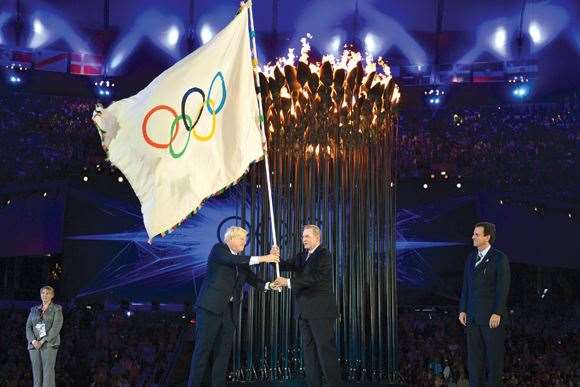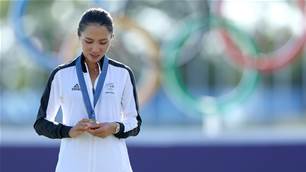London put on a Games-changer, something which could alter how, and where, major events are staged. Over to you, Rio.
London put on a Games-changer, something which could alter how, and where, major events are staged. Over to you, Rio.
 London mayor Boris Johnson passes a new Games legacy to Rio mayor
London mayor Boris Johnson passes a new Games legacy to Rio mayorEduardo Paes, via IOC prez Jacques Rogge. Image: Getty Images
London 2012 seemed to be progressing along the typically shambolic path of an Olympic host city, and when the tweets about four-hour bus rides from Heathrow to the athletes’ village started appearing, all the predicted chaos of a big-city Games was about to be realised. But a funny thing happened next: everything seemed to run smoothly. Even London’s notorious weather cooperated for the fortnight. The “gloomadon poppers”, who vexed mayor Boris Johnson so, turned out to be wrong.
A greater surprise may be yet to come. The positives out of the London Olympics have the potential to bend the course of one of the great games in sports business, that being site selection for major events.
Olympics, World Cups and their ilk had become something of a trade-off: undeniably fun and potentially lucrative, but also unwieldy to manage and saddled with long-term costs. For a period, these events became the province of global beta-cities trying to puff out their chests: Seoul, Barcelona, Atlanta, Salt Lake City, Vancouver and (dare we say it?) Sydney. The financial crisis then brought forth a class of new-money municipalities as hosts: Beijing, Sochi, Qatar and Rio de Janeiro, which now has the added pressure of following up a successful 2012 on top of pulling off this audacious World Cup-Olympic double of theirs.
These emerging-economy hotspots were seemingly the ones which the world’s sports journalists would have to get accustomed to over the coming years. Apart from the fact that these were the places that had the commercial wherewithal to get it done, the selection of these sites dovetailed conveniently with the desire of IOC and FIFA types to spread their showcases to all corners of the planet. That’s how we ended up with a Winter Olympics at what appears to be a beach town on the Black Sea in two years (which, incidentally, will also host matches for the 2018 World Cup), and why we’ll be playing for world football’s greatest prize in air-conditioned luxury in ten.
Everyone, however, now wants to be London. The core idea of avoiding the white elephant stampede is reaching meme-like proportions. Rio mayor Eduardo Paes said it will pattern its Olympics on the Brits – we’re hoping it means Pele makes fun of himself a la Mr Bean in the opening ceremony. But more than that, they’re thinking of importing the entire temporary 12,000-seat basketball arena from London. Qatar’s 2022 organisers, who have to build nine new stadiums for the Cup, are looking to use temporary seating in every venue, as well as remove one entire stadium in the aftermath, subtracting 170,000 seats out of a projected 600,000 total.
While the new wave of host cities takes these lessons on board, what will be interesting is how London’s example might tempt the old money back in. We’ve certainly gained enough time for repeat hosts to put their hand up – Tokyo is reportedly in the lead for the 2020 Games, while Paris observed what its cross-channel counterpart was doing with great interest. If Melbourne could countenance interrupting the sanctity of an AFL season, it could mount a reasonable case for hosting the Games again.
Perhaps the biggest lure of all for a bidding metropolis is how a major sports event can be a circuit-breaker in the tangle of big-city politics. An outstanding piece on the Grantland website detailed how New York lost out to London for the 2012 Games, undermined by its inability to secure its ideal spot for a stadium on Manhattan’s west side. However, many of the various new venues and stadium upgrades that were part of the bid did eventually go ahead – the benefits of having an Olympics without the inconvenience of, well, having an Olympics.
Your columnist had argued in this space for an Olympic rota, an established set of host cities that could get something back for its sunk costs. Of course, in some ways, it was highly wishful thinking about a return to Sydney. But there’s a new sense of legacy going around – no more monuments. It’s an altogether unusual feeling, not being able to criticise an Olympics or World Cup for being overwrought. Here’s hoping for a properly chaotic Games in the home of the Carnival.
From the November 2012 issue of Inside Sport
Related Articles

Lydia Ko becomes youngest Dame in modern history

Ko proud of her climb back to the top after self-doubt













